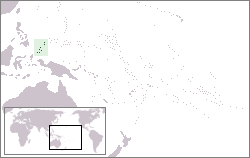
A popular initiative is a form of direct democracy by which a petition meeting certain hurdles can force a legal procedure on a proposition.
A constitutional amendment is a modification of the constitution of a polity, organization or other type of entity. Amendments are often interwoven into the relevant sections of an existing constitution, directly altering the text. Conversely, they can be appended to the constitution as supplemental additions, thus changing the frame of government without altering the existing text of the document.

Palau has a bicameral legislature, the Palau National Congress, consisting of the House of Delegates and the Senate of Palau, which both sit at the capitol complex in Ngerulmud, Melekeok State. The House of Delegates has 16 members, each serving four-year terms in single-seat constituencies. The Senate has 13 members, also serving four-year terms in multi-seat constituencies. In the last elections, held in 2020, only non-partisans were elected; no political parties exist.
In the politics of the United States, the process of initiatives and referendums allow citizens of many U.S. states to place legislation on the ballot for a referendum or popular vote, either enacting new legislation, or voting down existing legislation. Citizens, or an organization, might start a popular initiative to gather a predetermined number of signatures to qualify the measure for the ballot. The measure is placed on the ballot for the referendum, or actual vote.

The Equal Opportunity to Govern Amendment, also known as the Hatch Amendment or Arnold Amendment, is a proposed United States constitutional amendment that would remove the Constitution's requirement that the president and vice president must be natural-born citizens. It was proposed in July 2003 by senator Orrin Hatch, and would allow naturalized citizens to run for either office when they have been citizens for 20 years. The name Arnold Amendment is a reference to Arnold Schwarzenegger, a naturalized citizen and the governor of California from 2003 to 2011.

The National initiative is a proposed process to petition an initiative at the federal level in the United States via a national vote on the national ballot measure. While some U.S. states allow direct or indirect initiatives, there are currently no national initiatives in the United States.

Parliamentary elections were held in the Federated States of Micronesia on 6 March 2007, alongside a double referendum. Thirty-five candidates competed for the fourteen seats in Congress. As there were no political parties, all candidates ran as independents.

Parliamentary elections were held in the Federated States of Micronesia on 8 March 2005, alongside a three-part referendum. As no political parties existed, all 23 candidates for the 10 available seats in Congress ran as Independents.
Non-citizen suffrage in the United States has been greatly reduced over time and historically has been a contentious issue.

The following outline is provided as an overview of and topical guide to Palau:
Hokkons Baules is a businessman and a politician, and currently a member of the Senate of Palau. He has been the president of the Senate since 19 January 2017. He was elected in 2008 to fill the seat of the late Senate president Johnny Reklai. He had previously served in the Senate of the Second Olbiil Era Kelulau from 1985 until 1988.
Surangel Samuel Whipps Sr. is a Palauan businessman and politician. He served as the president of the Senate of Palau from January 2005 to April 2005, and from 25 April 2007 to 15 January 2009, and as the speaker of the House of Delegates of Palau from January 1993 to November 1996. He was born in Airai.

Proposition 7 of 1911 was an amendment of the Constitution of California that introduced, for the first time, the initiative and the optional referendum. Prior to 1911 the only form of direct democracy in California was the compulsory referendum.

The Constitution of Kenya is the supreme law of the Republic of Kenya. There have been three significant versions of the constitution, with the most recent redraft being enabled in 2010. The constitution was presented to the Attorney General of Kenya on 7 April 2010, officially published on 6 May 2010, and was subjected to a referendum on 4 August 2010. The new Constitution was approved by 67% of Kenyan voters. The constitution was promulgated on 27 August 2010.

A six-part referendum was held in Palau on 2 November 2004 alongside the country's general elections. Voters were asked questions on summoning a Constitutional Convention, payment of members of the National Congress, creating a unicameral Congress, term limits for Congress members, election of the President and Vice President and dual citizenship. All proposals were approved except the unicameral Congress, which despite receiving a majority of the public vote, did not meet the quorum of 12 of 16 states required for amendments to the constitution.

A constitutional referendum was held in the Northern Mariana Islands on 2 November 2010, alongside the election for the islands' representative to the United States House of Representatives. Voters were asked whether they approved of three proposed amendments to the constitution. All three were rejected.
A constitutional referendum was held in the Northern Mariana Islands on 6 November 2012, alongside the election for the islands' representative to the United States House of Representatives. Voters were asked whether they approved of three proposed amendments to the constitution. All three were approved.

A constitutional referendum was held in the Bahamas on 7 June 2016. Voters were asked whether they approve of four separate constitutional amendments. All four proposals were rejected.

A constitutional referendum was held in Palau on 1 May 2020. Voters were asked whether they approved of an amendment to article 1 of the constitution, which defined its maritime borders. The proposal was approved by 97% of voters.
Palau does not recognise same-sex marriage, civil unions or any other form of recognition for same-sex couples. The Constitution of Palau has forbidden same-sex marriages since 2008, though a campaign to repeal this ban was launched in 2019.











